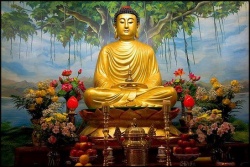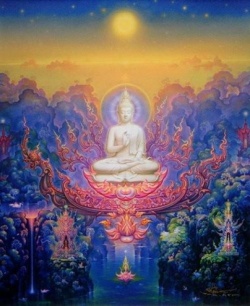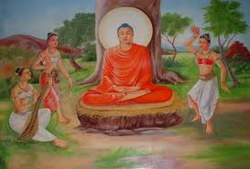The Dharma Realm of Bodhisattvas
Sentient beings when enlightened
Leap out of the dust.
Their six perfections and ten thousand practices
At all times are nurtured.
The second Dharma Realm is that of Bodhisattvas. Why did I say All people of the three periods of time above? It's because people can cultivate to go to any of the Ten Dharma Realms. Yet people are not beyond a single thought of the mind.
The Sanskrit word Bodhisattva is translated as "enlightened being" and has two meanings:
1. one who causes all sentient beings to become enlightened
2. an enlightened one among all sentient beings
We are included in both meanings. We all have a share of Bodhisattvahood because we are all beings. We can become enlightened ones among beings, and we can teach other beings to become enlightened as well. So being a Bodhisattva isn't bad. Not only do we have a share of Bodhisattvahood, we also have a share of Buddhahood.
"I don't get it," you say. "Dharma Master, you said earlier that Buddhas are just people who have realized Buddhahood. Well, why haven't we become Buddhas?"
Let's not talk about people becoming Buddhas. Consider a small child who grows up, becomes an adult, and eventually gets old. We are like children within the Buddhadharma, and the Buddha is an adult. When we grow up, we will become Buddhas. But right now, we are still children in Buddhism. As youngsters need milk, we constantly need the nourishment of hearing the Dharma. Listening to the Dharma is an especially good way to make our good roots grow and to bring forth our wisdom. An opportunity to listen to the Dharma is more valuable than any amount of money you could earn.
Today I'm going to make a rule. I hope that from now on all of you will not take so many holidays and go on so many trips. Take the study of the Buddhadharma as your trip. Spend your holidays studying the Buddhadharma. Why do I say this? Because it's very dangerous to travel. Every holiday there are many fatalities, and if you travel, you might end up being one of them. We want to change the trends of this country. The people in this country are fond of recreation and travel. Buddhists should not take so many vacations. We can use this time to study the Buddhadharma. Even better, we can chant sutras, recite mantras, and bow to the Buddhas!
There is infinite merit and virtue in bowing to the Buddhas.
Bowing before the Buddhas can eradicate offenses
As numerous as the Ganges' sands.
If you bow to the Buddhas, you can cancel as many offenses as there are grains of sand in the Ganges River. It is also said, "Giving a single penny brings limitless blessings." However, I'm certainly not asking for money from you. You should understand that. You can make contributions to other monasteries and earn great blessings that way. We here are so wretched that we don't have the blessings to receive offerings. If we accept too many offerings, we might die. If no one makes offerings, maybe we can live a few days more. Despite the suffering, we still wish to live a little longer. We don't want to die yet. Therefore, if you wish to give money, you can give it to other places. There are plenty of places where you can plant blessings; you don't have to do it at this monastery, because Gold Mountain Monastery has only wretched people with few blessings. If you seek blessings here, you'll be disappointed. But don't worry, we won't starve!
Sentient beings when enlightened, leap out of the dust. Their six perfections and ten thousand practices.
At all times are nurtured. A Bodhisattva is a sentient being; among sentient beings, he's an enlightened one. Among the enlightened, he's one who understands. Among those who understand, he's a cultivator. Among cultivators, he's one who truly practices. A Bodhisattva "leaps out of the dust." If he did not have understanding, he wouldn't be able to transcend the defilement. The dust would be so thick that he wouldn't be able to leap out of it. When he becomes enlightened, the dust thins out and he can leap out of it.
After a Bodhisattva leaps out of the dust, what does he do? Sleep and eat?"
Yes, he still sleeps, eats, and wears clothes; but he no longer works like a slave to provide his body with food, clothing, and a place to live. When you get out of the dust, you cease to be concerned with these three problems, and instead you concentrate on cultivating the six perfections: giving, holding precepts, patience, vigor, concentrationd wisdom.
I know what the perfection of giving entails. It involves telling others to make offerings to me," some of you are thinking. Wrong. It is learning to give to other people. As for money, it would be nice to shred it up. We shouldn't want so much of that filthy stuff. Money is an extremely defiling possession, and too much involvement with it is what is meant by "dust." If you don't want money, then you will be extremely pure and will be able to transcend the "dust." Some of you have now transcended the "dust" because you are holding the precept of not handling money. However, make sure you don't get contaminated by money again in the future.
You should also cultivate the ten thousand practices and nurture them at all times. You cannot say, "I'll cultivate today, but not tomorrow. I'll cultivate this year, but not next year. I'll cultivate this month and take a rest next month. I'll cultivate this life, but not next life." To cultivate one moment and sleep the next moment won't work. At all times you should nurture your cultivation of the six perfections and ten thousand practices. Cultivate them in life after life. If you practice in this way, you will be a Bodhisattva.
"That's not easy," you say.
Did you think that being a Bodhisattva would be easy? Not only is it not easy to be a Bodhisattva, it's not easy to be a Shravaka or a Pratyekabuddha, either.
"Then what is it easy to be?"
It is easy to be a ghost, to go to the hells, or to become an animal. If you want things to be easy, you can be those beings. If you want to be a Bodhisattva, it won't be easy. You say it's difficult; the word difficult" describes what Bodhisattvas do.
Bodhisattvas must be able to do what others cannot do; they must endure what others find difficult to endure. When people consider a job too difficult, they say, "That's all right; we'll handle it." They are not put off by difficult tasks. If you don't dare to do what is hard, you are not a Bodhisattva. Go forth with vigor! That's what a Bodhisattva is like; there is no other esoteric or wonderful secret. If you can do the things that other people cannot do, you are a Bodhisattva.



